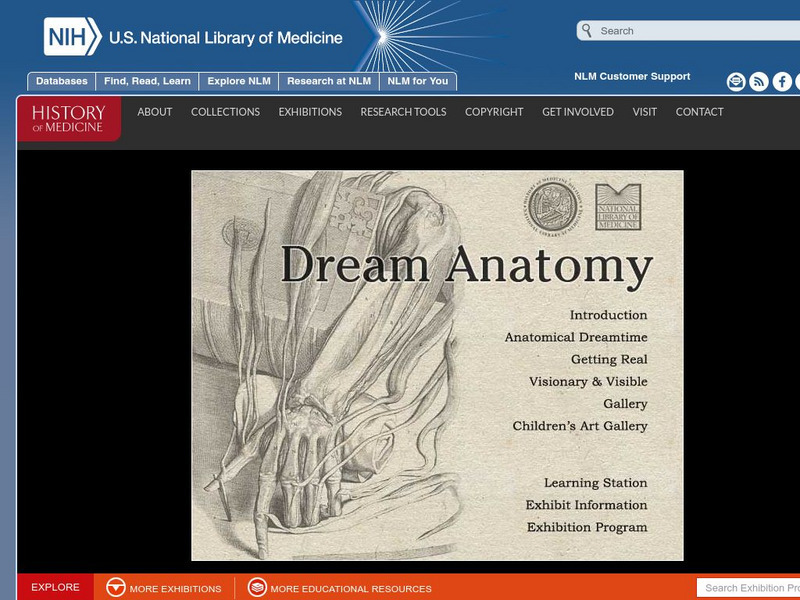Hi, what do you want to do?
PBS
Pbs Learning Media: Amazing Heart Facts
This feature from the NOVA: "Cut to the Heart" highlights facts about the heart, including its size and placement, and will help you to understand the importance of this wondrous organ in our bodies.
National Cancer Institute at the National Institutes of Health
Seer Training Modules: Introduction to the Human Body
Self-guided learning activity where students learn about the functions, processes, and anatomy of the human body. There is a short quiz at the end of the lesson to check for understanding.
US National Library of Medicine
Medline Plus: Stress Echocardiography
A stress echocardiogram can help a doctor see how the heart responds to exercise. This tutorial explains how the test works and its risks and benefits.
CK-12 Foundation
Ck 12: Biology: Muscle Contraction
[Free Registration/Login may be required to access all resource tools.] Describes how muscles contract according to the sliding filament theory.
Virginia Tech
Virginia Polytechnic Institute: Greenhouse Dinosaur Extinction Theory
This comprehensive page discusses the Asteroid Impact vs. Volcano-Greenhouse dinosaur extinction debate. It was written by paleontologist, professor, and scientist Dr. Dewey McLean.
Nobel Media AB
The Nobel Prize: Paul Ehrlich Nobel Lecture: Partical Cell Functions
At this site from the Nobel e-Museum you can download and read Paul Ehrlich' Nobel Lecture, "Partial cell functions," originally given December 11, 1908. The lecture is available in PDF format.
Nobel Media AB
The Nobel Prize: Robert Koch Nobel Lecture
This site from the Nobel eMuseum of the Nobel Foundation allows you to read Robert Koch's Nobel Lecture, "The current state of the struggle against tuberculosis," which was originally given by Koch on December 12, 1905.
Able Media
The Asclepion: Medicine in Ancient Egypt
Technical but fascinating Classics Technology Center site gives evidence from papyri, art, and burial remains about the medical abilities and advancements of ancient Egypt. Includes reports of polio and tuberculosis.
Nobel Media AB
The Nobel Prize: Frederick G. Banting Biographical
At this site from The Nobel Foundation you can read about Frederick Grant Banting's work in the medical field, specifically his discovery of insulin, a discovery which earned him the 1923 Nobel Prize, a prize he shared with John James...
Biology Pages
Kimball's Biology Pages: Transportation in Plants
A very good explanation of the processes of water transport in plants. Includes graphics that accompany this very detailed explanation.
McGraw Hill
Mhhe: Plant Growth and Growth Regulators
A very good overview of the hormonal control of plant responses to different environmental cues. Good place to start research.
National Institutes of Health
National Library of Medicine: What's Happening to Your Body?
This lesson plan site focuses on the changes that adolescents go through and delves into their nutritional, physical, and mental health needs.
PBS
Pbs Learning Media: Is Lactic Acid a Four Letter Word?
This essay by exercise physiologist Patti Finke and fitness consultant Warren Finke describes the process by which our bodies transform food energy into energy that our cells can use.
University of Washington
University of Washington: Lights,camera,action Potential
This site from the University of Washington is a good site that describes the steps in the process to create nerve transmission. A good page.
University of Washington
Neuroscience for Kids: Pcp Phencyclidine
Read about how PCP affects the behavior and mindset of those who use it. This website includes pictures and simple charts, making it ideal for students of all ages wanting to learn more about this hallucinogenic drug.
Ohio State University
General Plant Biology: Development: Flowering to Senescence
A good overview of the development of plants. Includes a section on the dormancy of plants that covers the basics.
Iowa State University
Iowa State University: How a Corn Plant Develops
The Iowa State University provides a good description of the development of an important crop plant. The overview compares favorably with the development of any plant.
Other
Tiem: Synapse Transmission
A good description of the process of transmission across the synapse in nerve cells.
Other
Marine Biological Laboratory: Why Study Marine Organisms for Biomedical Research
Descriptions of various research projects using marine organisms that have direct impact on medical research. The resource has a perspective on how medicine makes progress.
Other
The Dinosaur Museum
The Dinosaur Museum is located in Blanding, Utah. Use this site to learn all about the exhibits and dinosaur information.
National Institutes of Health
National Library of Medicine: Dream Anatomy
Take a step back in time to see the human body and the field of medicine through the looking glass of history. Experience a different kind of representation of our internal anatomy, and learn about the history of human dissection.
University of Missouri
University of Missouri: Determining Age of Horses by Their Teeth
Can the age of horses be determined by looking at their teeth? Yes it can and this competent site explains how to do it.
Famous Scientists
Famous Scientists: Francis Crick
Discover Francis Crick, British molecular biologist, physicist, and neuroscientist who jointly won a Nobel Prize for his discoveries concerning the molecular structure of nucleic acids.
Famous Scientists
Famous Scientists: George Beadle
Find out about the scientist George Beadle, who helped discovered how genes played a part in the regulation of biochemical events.
Other popular searches
- Anatomy and Physiology
- Human Anatomy and Physiology
- Anatomy & Physiology
- Exercise Physiology
- Heart Anatomy and Physiology
- Human Physiology
- Anatomy Physiology
- Plant Physiology
- Anatomy and Physiology Web
- Plant Anatomy and Physiology
- Physiology of the Ear
- Human Anatomy & Physiology



















